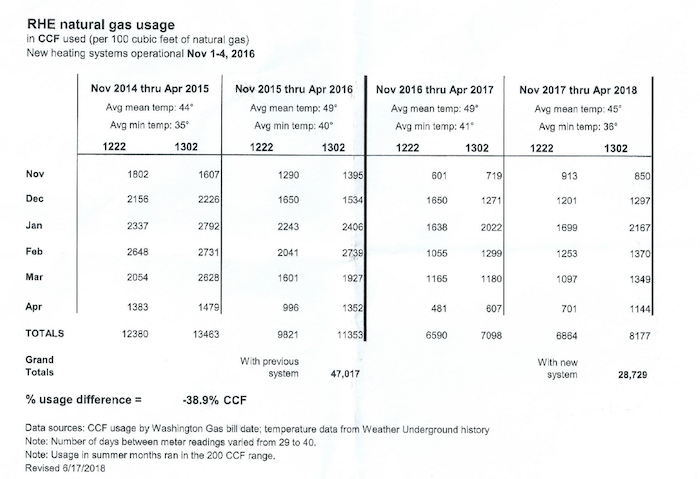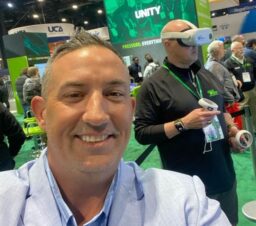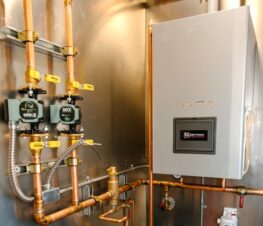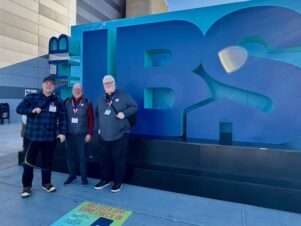In late winter 2016, Dan Foley, Foley Mechanical Inc., was called in to look at a commercial boiler system in a 52-unit apartment building in Arlington, Va. One of the building’s board members was a current customer and thought Foley could help sort out some issues they were having with this building. When Foley surveyed the system in late March 2016, the weather was mild but the cast-iron forced draft boiler was firing away and the boiler room had to be close to 100ºF. Water was dripping from a cracked boiler section. Several cracked sections had been replaced over the past several years. The section now leaking had been replaced the previous December. It did not make it through one season.
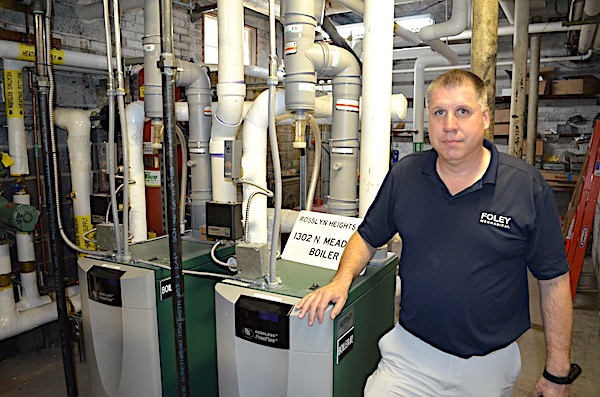
Dan Foley stands beside two PB Heat/Peerless Brand PureFire boilers. The system consumed 47,017 cubic feet of gas before the retrofit and 28,729 cubic feet of gas after for a total savings of 40%.
The board was tired of paying repair costs and high gas bills, while dealing with “no heat” situations on a regular basis. The tenants were complaining of being uncomfortable with “too hot” being the biggest complaint. During his survey, Foley noted numerous open windows with temperatures close to 80ºF in the units. No wonder the gas bills were so high!
The boiler was from a reputable manufacturer. It was unlikely defective castings that were the cause of the cracked sections. This was proven out as Foley dug into the control strategy. The boiler was turned on in the fall with the burner controlled by the high limit. T-T was jumped out and boiler hovered around 180ºF. The system pumps were controlled by an outdoor thermostat set to 60ºF. When the ambient temperature dropped below 60ºF, the pumps kicked on circulating hot water to the radiators.
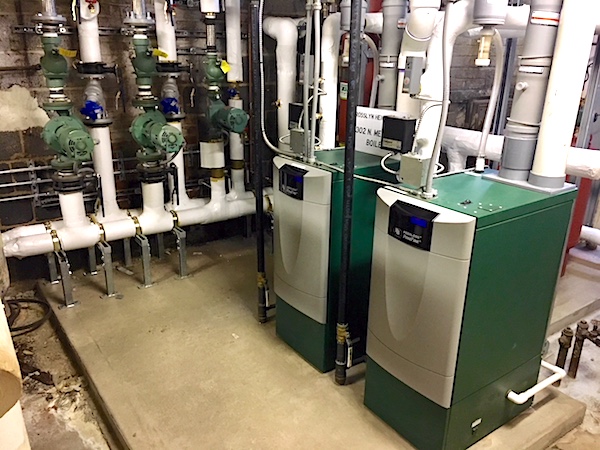
The boiler room includes two PB Heat/Peerless Brand PureFire condensing gas boilers, which provide heat and domestic hot water (DHW) to the building.
Not only was this control setup extremely wasteful and inefficient, it was murder on the cast iron. When the pumps first kicked on, the flow of cold water hitting the 180ºF cast iron caused them to eventually crack and fail.
Domestic hot water was provided by a 20+-year-old copper fin tube boiler tied to a storage tank. This system was piped and controlled properly but was old and in need of constant repair. It was also suffering from regular breakdowns leaving 52 units with no hot water.
Foley’s goal was to present a solution that was comfortable, reliable and efficient, in that order, and he sought the help of his PB Heat/Peerless Brand rep, Jeff Riley of COREDRON LLC. They came up with a solution which Foley presented to the board. One board member was recalcitrant and wasn’t buying into Foley’s solution, “We do not have the capital budget to replace all of this equipment at this time. We need a lower cost solution.”
To which Foley responded, “You are paying for this whether you want to or not. You are paying for repairs and emergency service. You are paying high gas bills. And you are paying through tenant dissatisfaction with the no heat and no hot water situations. Why not direct this capital towards a permanent solution?”
After some conjecture, the board approved Foley’s proposal in the summer of 2016 and his crew got to work in late September. Foley demo’d the cast iron boiler as heat was not yet needed. They also removed the near boiler piping, pumps and controls. They left the domestic hot water (DHW) system connected, as they needed two weeks to pipe the boiler room.
Foley selected two PB Heat/Peerless Brand PureFire stainless steel modulating condensing gas boilers. After performing a load calculation, Foley was able to reduce the boiler capacity by over 20%. The existing boiler was grossly over-sized. Foley chose two boilers to provide redundancy, as well as to provide low load capacity without short cycling. The PureFires have a cascade control built in eliminating the need for an external staging control.
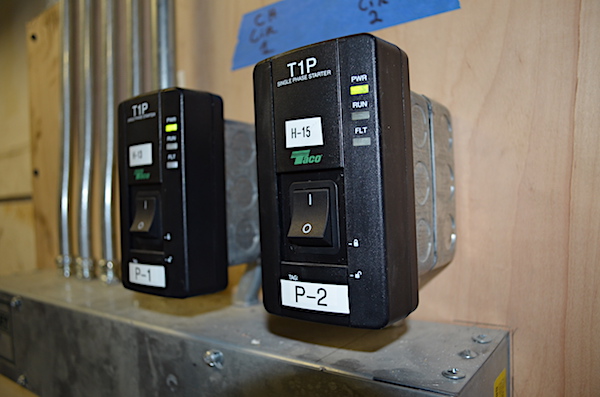
All line voltage wiring and switches, which serve the boiler system, were upgraded.
Venting the boilers was a challenge, as Foley could not sidewall vent the boilers due to the proximity of windows above the boiler room. Riley connected Foley with the PB Heat/Peerless Brand engineering department to come up with a solution. They enlisted help from Centrotherm to devise a custom vent design utilizing the existing 40’ tall chimney as a chase. A twin 4” flexible polypropylene (PPS) liner connected to a custom designed chimney cap solved the problem. Fresh air was piped in from the sidewall while combustion products were vented safely through the PPs vent pipes up the chimney chase to the roof.
The near boiler piping was replaced along with the boiler and system pumps. A hydro-separator was utilized to balance boiler and system flow. The new boilers provide the building’s domestic hot water through a commercial reverse indirect tank. Foley also replaced a broken domestic recirc. pump. All of the exposed piping was insulated with fiberglass pipe insulation and identified with pipe markers.
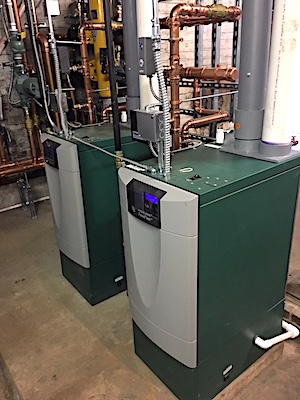
Recently completed project; before piping was insulated.
Foley was ready to fire up this system in late October 2016. This was perfect timing as the Indian summer gave way to colder autumn weather. Foley enlisted the help of Rich Michael, PB Heat/Peerless Brand Commercial Specialist, to help with the start-up. Foley programmed the controls to turn on the heat when the outdoor temperature dropped below 58ºF. An integral reset control adjusts the supply water temperature to match the building heat loss, ensuring tenant comfort. The PureFire control system will modulate and stage the boilers as necessary to maintain the comfort level in the building, as well as to rotate the lead boiler for even wear.
The boiler control will also handle the DHW priority load and direct the hot water to indirect tank. When the indirect tank calls, the boilers ramp up to high fire and run up to 180ºF supply water temperature to quickly handle the load.
Rich worked with Foley’s lead tech, Brian Golden, to adjust the combustion parameters and get the burners dialed in. This was a great help as these boilers were new to Foley. Rich was also helpful by phone as we fine-tuned some of the control parameter settings as the weather turned colder.

The 1950s apartment building in Arlington, Va. gets a mechanical upgrade.
After the initial tuning, the system worked flawlessly to provide even heat and endless domestic hot water. The board decided to have us install the identical system in an adjacent building the following month. Both buildings have been operational since November 2016.
Neither building has suffered a no heat or no hot water since the systems were installed. Comfort level has been optimized through the reset control eliminating the open window solution to over-heating. Foley knew they would decrease fuel usage but he could only guess at the savings.
One of the board members compiled and tabulated fuel usage for two years before and after the upgrade. In summary, the heating system consumed 47,017 cubic feet of gas with the previous system and 28,729 cubic feet of gas after the upgrade for a total savings of 40%. At this rate, it won’t take long for the board to recoup their investment.
We have since replicated this system in another adjacent building with one more scheduled for spring 2019.
Dan Foley is president and owner of Foley Mechanical, Inc. based in Lorton, Va. (www.foleymechanical.com) FMI specializes in radiant, hydronic and steam systems, as well as mechanical systems for large custom homes. He can be reached at 703-339-8030 or at dfoley50@verizon.net.

